Acer V7-482PG-9884 Review: Everything You Need
by Jarred Walton on August 24, 2013 12:00 AM ESTAcer V7 Battery Life
So far we’ve looked at CPU and GPU performance metrics, but perhaps more important on any laptop is going to be battery life. Improving power use/battery life was one of Intel’s key goals with Haswell, and so far we’ve seen clear evidence of that in the Haswell laptops that we’ve reviewed. The Acer Aspire V7 confirms that trend, boasting some of the best (normalized) battery life figures that we’ve seen from a Windows laptop.
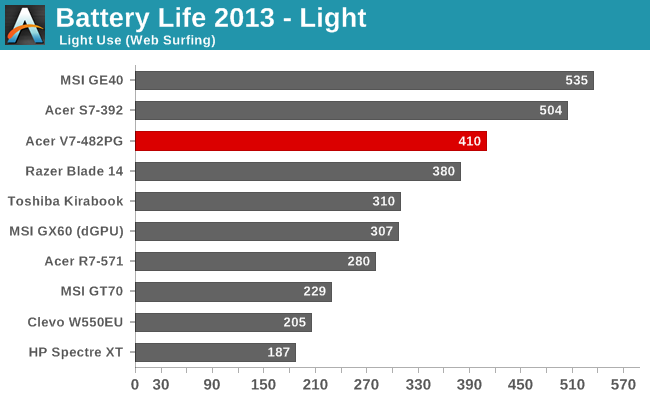
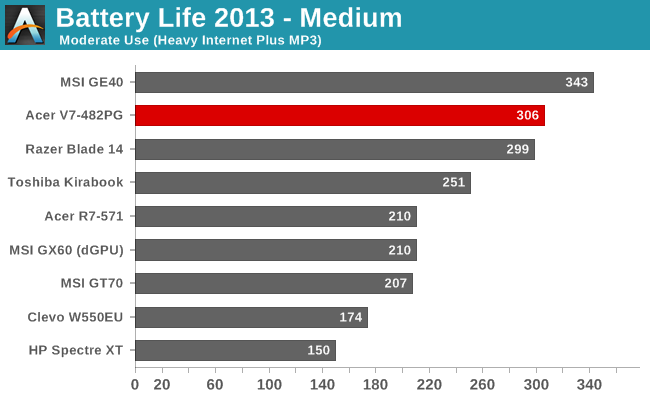
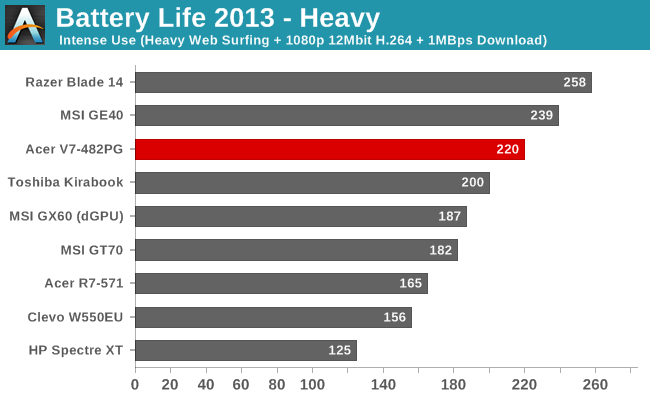
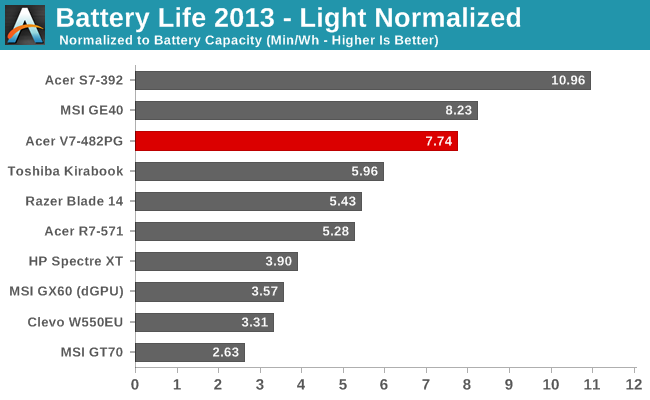
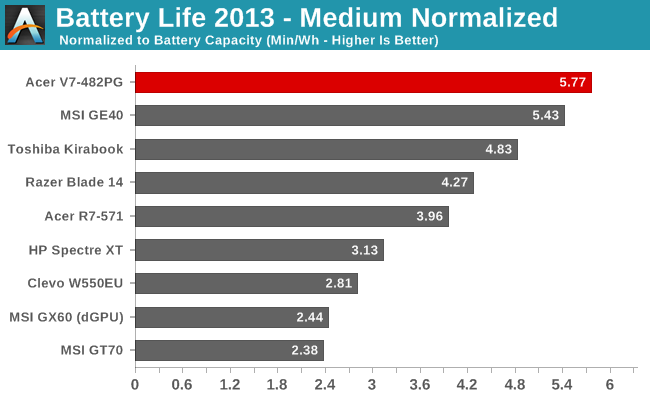
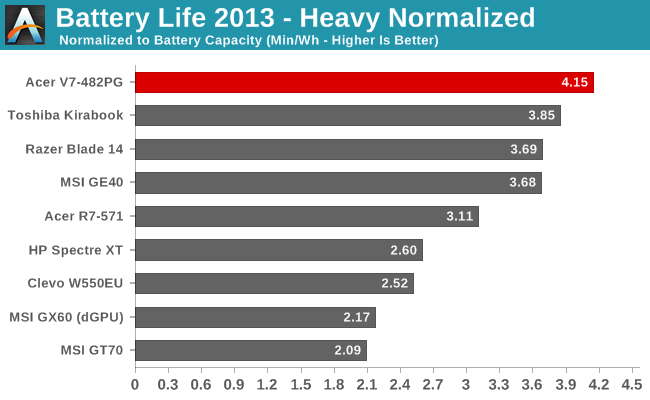
The 53.6 Wh battery isn’t the highest capacity battery you’ll find on market, but it’s the same capacity that Apple uses in the MacBook Air 13 (2013). What’s not the same is the battery life that you get with Windows compared to OS X. With Haswell, the Aspire V7 basically matches what Apple was able to do with the MacBook Air 13 (2012): around seven hours of battery life in our light workload. For reference, the new MBA13 delivered 11 hours in the same test. Still, the Haswell laptops are all posting significant gains over the previous generation Ivy Bridge laptops.
And thanks to NVIDIA’s Optimus Technology, even laptops with discrete GPUs like the MSI GE40 and Acer V7 don’t take a hit to battery life – at least when the GPU isn’t active. Power up the GPU and run a game, on the other hand, and the story changes quite a bit: we measured just 98 minutes of battery life looping 3DMark11 on the Acer V7 (with the GPU set to “prefer maximum performance” in the control panel and using the Balanced power profile). That might seem terrible, and it’s certainly not great, but higher performance GPUs are almost always throttled on battery power, regardless of what settings you use – the MSI GE40 delivered slightly less battery life in our simulated gaming test, with roughly the same performance as the Acer V7 under the same conditions. So basically, on battery power the GT 750M and GTX 760M aren’t all that different, despite the latter having twice as many shaders and substantially more memory bandwidth.
Getting back to the battery life aspect, the V7 posts good results certainly, but I was hoping for even a bit more from our first complete Haswell Ultrabook review. Perhaps the 14” touchscreen is part of the issue, as it could be sucking down precious milliwatts. Other components are also likely a factor, as the Acer S7-392 is quite close to the MBA13. Ultimately, we’re looking at average power draw for the entire laptop of around 7.7W in our Light test on the V7 compared to roughly 4.8W for the MBA13 in the same test under OS X; the S7 Haswell Ultrabook measured 5.4W, which is pretty close to the same sort of gap we’ve seen in the past. As for the V7, coming up with items to account for almost 3W is difficult.
I’m frequently amazed at how much better battery life is with Apple hardware under OS X. We’ve seen in the past that Apple usually optimizes (in a good way) quite heavily in their OS to achieve good battery life, and when you switch to Windows via Boot Camp you lose a lot of battery life. Anand didn’t test Windows battery life with the new MBA13, but I wonder what it’s like, because the usual 30% drop would put it on equal footing with something like the V7. I suspect with Haswell, the opportunities to further tune the OS and hardware for improved battery life are even greater, though, so we might see a 50% drop in battery life with the MBA13 under Windows.
If you need 10+ hours of battery life in Windows, it looks like you’ve got a couple options right now: get a system that’s not as fast (e.g. the V7 has a discrete GPU and hybrid storage with 12GB RAM while the S7 is iGPU only, pure SSD, and 8GB RAM), or find something with a higher capacity battery or a slice battery. For seven hours of useful work – and potentially eight or more if you turn the LCD brightness down a few more notches and don’t constantly surf the Internet – the V7 should be sufficient for most users.










62 Comments
View All Comments
tackle70 - Saturday, August 24, 2013 - link
I guess I'm just a computing dinosaur... I do almost all my work on desktops, and while I love a laptop as a backup portable work/netflix/whatever box, I just can't stomach the thought of spending $1k+ on one.My 2.5 year old $450 HP Probook 4430s may have a fugly screen and not be the thinnest or fastest thing out there, but I can't see replacing it anytime soon for how I need to use a laptop.
Impulses - Sunday, August 25, 2013 - link
Guess that makes me a bit of a dinosaur too... Or just a geek and a gamer, I've been thinking of getting a laptop for a while to replace an aging netbook but between my desktop and my tablet I tend to use the netbook a whole lot less than I used to...And I wouldn't be happy with a budget laptop (let alone another netbook) if it weighed half a dozen pounds or had a crap screen (not after getting 3x24" IPS displays for the desktop and looking at the new Nexus 7 display...). Work needs might eventually force my hand tho, and while I'd like a system like this Acer I'd probably opt for something slightly cheaper/lighter without a dGPU.
et20 - Sunday, August 25, 2013 - link
Good review. Thank you.Please stop saying "the only company that can get away with charging Apple prices is Apple".
It's stupid and insulting.
It's insulting to Acer and the other manufacturers to imply that they don't deserve proper margins for developing good products.
It's insulting to consumers to imply that most of them are not discerning enough to pay what a good product is worth.
It's insulting to Apple to imply that they somehow "get away" with making more than subsistence profits for building good products.
It's insulting to Apple product users to imply that they're been fooled into paying more than rock bottom prices for good products.
So just stop with this BS and admit that Mac and PC hardware offer largely the same value for money.
JarredWalton - Sunday, August 25, 2013 - link
You can say "it's insulting" all you want, but that doesn't make it true. The reasons for why Apple can charge more are numerous, but just to cover a few:1) Brand recognition
2) Good products
3) Unique OS
4) An ecosystem that many users like
I don't personally like Apple products enough to own them, other than an iPod Touch I got from work, but they do get plenty of things right. There is however no question that Apple charges a significant premium on their products; the old joke is "everyone buys two, so if you have a problem the first replacement is free, no questions asked." To suggest that they're "largely the same value for money" is stupid and insulting to anyone that can do math. Let me go over it again:
MacBook Air 13: $1300, Acer V7-482PG-9884: $1300
On the Apple side:
Build quality: minor win for Apple; let's be generous and call it $100
256GB SSD: $100 more than 24GB + 1TB HDD
Thunderbolt: $50 (again, being more than generous)
+$250 relative value
On the Acer side:
Better 1080p AHVA LCD: $75 more than 1400x900 TN
Touchscreen: $100 extra
Faster i7 CPU: $150 more than i5-4250U
GT 750M: $100 add on
+$425 in relative value (BoM costs)
So right there, with some math that's very kind to Apple, we have at least a $175 additional profit margin for the MacBook Air 13 (upgraded model). If we were to go through all of the components for both laptops and figure out a realistic BoM, I figure Apple's total profit margin on the upgraded MBA13 is roughly twice what Acer makes off the V7-482PG. And yet, Apple will sell 10X or maybe even 100X MBA13 as Acer will of the V7-482PG.
Oh, but to suggest that Apple can charge more because they're Apple is stupid and insulting. I forgot.
teiglin - Sunday, August 25, 2013 - link
It's a bit silly to add after Jarred's clear (and snarky) response, but any discussion of "value" has to bear in mind that many factors that influence value are subjective. On the Apple front in particular, I was in the market for a 13" laptop recently and strongly considered the MBA, thanks largely to touchpad quality, plus the unique availability of HD5000 vs. HD4400 in all the available ultrabooks. However, for me, shipping OSX is mostly a downside--it adds the cost of a Windows license to my purchase, not to mention a nonstandard keyboard layout under Windows.So value is in the eye of the beholder. The fact that Macs have higher profit margins than most Windows boxes is not an insult to Mac users; it just means that Mac users are willing to pay more money for less hardware, in order to get the other benefits of owning a Mac. Life would be simpler if Apple fanboys (really, fanboys of all stripes) would be a little less touchy about perceived attacks on themselves or their company.
Impulses - Wednesday, August 28, 2013 - link
To me, the only strong value proposition involved with a Macbook is the fact that after 2-3 years of use someone's likely to pay me 2-3x for it what an equivalent Windows laptop PC would be worth at that point... Resale value's not enough of a reason for me to deal with bootcamp etc tho. They're nice systems and all, just not for me.I'm not sure when companies started deserving higher margins or not or howthis somehow became a moral issue... Brand recognition and PR (backed up by solid build quality) sells and can easily inflate a product's worth, don't be naive and try to pretend otherwise.
ananduser - Sunday, August 25, 2013 - link
There is no shame in charging extra for the brand. If you truly believe that your company makes premium products, then you must price accordingly. You may buy macs for their technical nuances and exclusivities, but I'm afraid you're in the minority. So, unless you need OSX, you're relatively paying more for less; Jarred above me is right.joe_dude - Monday, August 26, 2013 - link
The Canadian model of the V7 is far better in terms of price point. As for Apple, they will always be "pay more for less". Also, battery life would last longer if the extra diagnostics were turned off, since Windows continually writes that info to disk. It's for enterprise/network use (which is something Apple doesn't have to worry about).dareo - Monday, August 26, 2013 - link
Is it possible to easily swap out the 24GB SSD Cache on this model with a Samsung 840 EVO 256GB SSD, using it as the primary drive for the OS and apps, and reserving the HDD for documents?JarredWalton - Monday, August 26, 2013 - link
From the hardware side, it's easy. On the software side, you'll basically want to do a clean install of the OS and you wouldn't want ExpressCache running as you would have no need for it. For most of our readers, I'd guess doing a clean Win8 install is simple enough, particularly if they're willing to open up the laptop and replace the mSATA drive in the first place. :-)